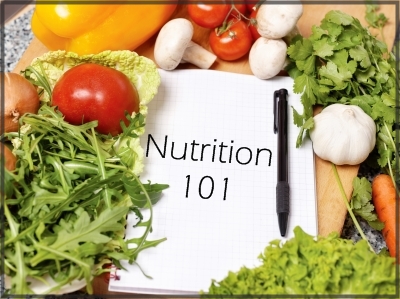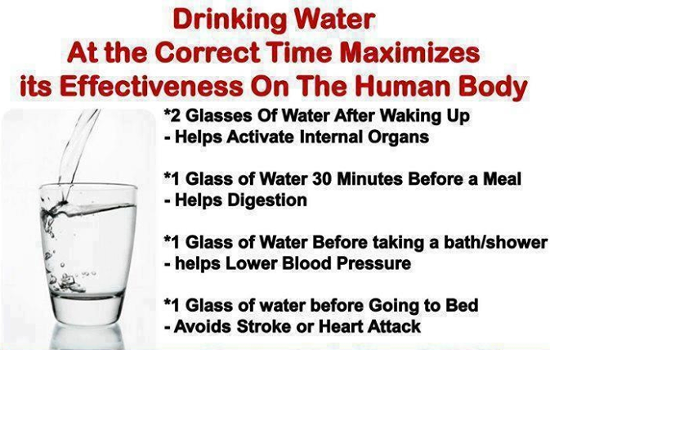 Why Is Water So Important To Our Health
Why Is Water So Important To Our Health
Water is fundamental to all life on Earth and clean water is essential to our health. We can survive without food for about 5 weeks, but our lives would end in 3-5 days without water. The human body is 2/3rds water, making up about 70% of our body weight. The brain and muscle are about 75% water and blood is 85% water content! It is the primary component of all the bodily fluids—blood, lymph, digestive juices, urine, tears, and sweat. Water is involved in almost every bodily function: It helps transport nutrients and waste products in and out of cells, is necessary for all digestive absorption, circulatory and excretory functions. It is also needed for the maintenance of proper body temperate. By drinking an adequate amount of water each day, you can prevent symptoms of headache, muscle weakness, constipation, fatigue, perceived hunger etc. (signs of dehydration).
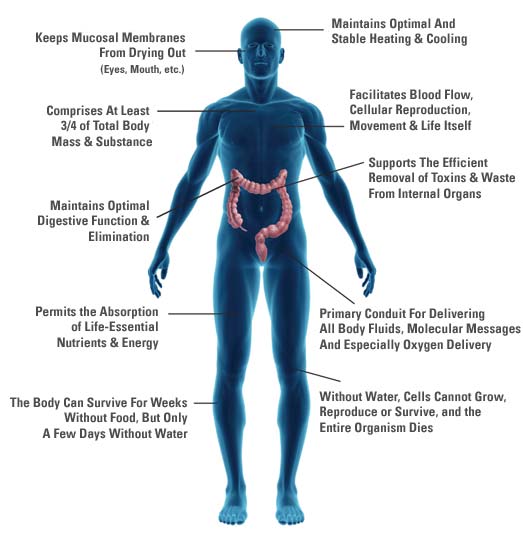 A few of many reasons why water is ESSENTIAL to our health:
A few of many reasons why water is ESSENTIAL to our health:
– Water carries nutrients and oxygen to cells
– Water moistens the mouth, eyes, and nose
– Water regulates our body temperature
– Water lubricates joints and protects organs and tissues
– Water helps flush out waste/toxins from the vital organs and lymph (lessens the burden on the kidneys & liver)
– Water helps dissolve minerals and make them more absorb-able in the body
– Water allows for proper digestive functioning and helps prevent constipation
– Water carries the electrolytes, mineral salts that help convey electrical currents in the body; the major minerals that make up these salts are sodium, potassium, calcium, magnesium, and chloride.
Holly Cow! That is amazing how necessary this calorie-free, nutrient-free beverage is to our health and survival. Seeing as we constantly lose water through our sweat, urine and breath, it’s necessary to consistently replace this loss by drinking lots of water.
How much water do I really need?
It’s a simple question with no simple answer. Studies have produced varying recommendations over the years, but there is no one-size-fits-all approach to water consumption. The advice to drink ‘8-glasses of water a day’ is not supported by hard evidence, and is potentially popular because of it’s specificity and easiness to remember. The Institute of Medicine has determined that an adequate intake for men is actually about 3 liters (13 cups) of liquid a day, and 2.2 liters (9 cups) for women. With that number in mind, it’s important to modify your water intake depending on how active you are, what climate you live in, your health status, and whether or not you’re pregnant or breast-feeding. The average North American drinks only 4 cups of water a day, which means most people are experiencing some level of dehydration. Your individual water needs depends on a number of factors.
– In hot or humid weather, you need to drink additional water to help lower your body temperature and to replace what you lose through sweating. Indoor heating can also cause your skin to lose moisture, increasing your daily fluid requirement.
– When exercising and sweating, in order compensate for the fluid loss. An extra 2 cups of water should suffice for short bouts of exercise, but intense workouts require more water intake. How much depends on the individual and how much they sweat during exercise and the duration of exercise. It’s important to drink water both before and after exercising.
– Pregnancy or breast-feeding: Women who are expecting or breast-feeding need additional fluids to stay hydrated. Large amounts of fluid are used especially when nursing.
– When you have a fever, vomiting or diarrhea, your body loses additional fluids. One must also drink more water if they develop frequent bladder infections or urinary tract stones (proper hydration can prevent these conditions!).
– It’s also necessary to drink even more water when you are in a geographic area with high altitudes greater than 8,200 feet (2,500 meters) as this increases urination and more rapid breathing that uses up fluid reserves.
Dehydration
Lack of water can lead to dehydration, a condition that occurs when you don’t have enough water in your body to carry out normal functions. Severe dehydration can lead to blood clots, seizures, and other potentially fatal complications. Studies have shown that even mild dehydration can have adverse effects on mood and energy. That’s why it’s so important to catch dehydration early on, but the signs aren’t always obvious like thirst and fatigue.
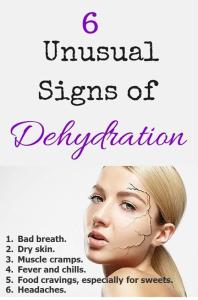 Here are six surprising indicators that you might be dehydrated.
Here are six surprising indicators that you might be dehydrated.
Bad breath. Saliva has antibacterial properties in it, but dehydration can prevent your body from making enough saliva. If you’re not producing enough saliva in the mouth, you can get bacteria overgrowth and one of the side reactions of that is bad breath from chronic dehydration.
Dry skin. As you go through various stages of dehydration, you become very dizzy and you don’t have enough blood volume so you get very dry skin. That is because the skin is dry and not evaporating as well, you can also experience flushing of the skin.
Muscle cramps. The hotter you get, the more likely you are to get muscle cramps, and that’s from a pure heat effect on the muscles. As the muscles work harder and harder, they can seize up from the heat itself. Changes in the electrolytes, changes in the sodium and potassium can lead to muscle cramping as well.
Fever and chills. If your body is severely dehydrated you may experience symptoms like fever or even chills. Fever can be especially dangerous, so be sure to seek immediate medical help if your fever rises over 101°F.
Food cravings, especially for sweets. When you’re dehydrated, it can be difficult for some nutrients and organs like the liver which use water to release some glycogens and other components of your energy stores, so you can actually get cravings for food. While you can crave anything from chocolate to a salty snack, cravings for sweets are more common because your body may be experiencing difficulty with glycogen production.
Headaches. The brain sits inside a fluid sack that keeps it from bumping against the skull. If that fluid sack is depleted or running low because of dehydration, the brain can push up against parts of the skull, causing headaches.
Not sure if that sweet craving is a sign you need to hydrate?
Check your urine. The key is your pee (seriously): If you’re well-hydrated your urine will be mostly clear with a tinge of yellow. The more hydrated you are, the more diluted the urine, which means the color is lighter. Yellow, chardonnay, and orange are the “warning” colors to watch for. When your body is about three percent dehydrated your urine will be noticeably yellow. When your body is about five percent dehydrated, your urine will appear chardonnay-colored. When your body is more than five percent dehydrated – which is considered severely dehydrated – your urine will appear orange.
Urination is a process of waste-removal, so it’s best to flush out as often as possible. That said, if you are urinating every 2-3 hours you are likely drinking enough water.
 Can Water Really Help You Lose Weight?
Can Water Really Help You Lose Weight?
Water consumption is directly correlated with weight loss. But before you start chugging water, let me clarify water does not have some magical property that burns fat (sorry!), but it definitely can help you with your weight-loss efforts (hooray!) here’s how.
First off, staying hydrated could help you avoid overeating. A lot of people confuse thirst for hunger, so they’ll tend to eat rather than drink water. If you’re craving a midday snack and want to make sure your pangs are caused by hunger, not hydration, have a glass of water first. Then see if you’re still hungry 30 minutes later. Also important to keep in mind: If you’re continually staying well hydrated, that false cue won’t happen. Of course, drinking water also means you’re not drinking something else—such as sugary, caloric beverages. That said, this doesn’t mean that you should go around guzzling water nonstop to avoid dehydration. (Though it is rare, it’s actually possible to drink too much water)
What about the water we obtain through the food we consume?
Craving something sweet? Reach for a snack that has high water content. Most fruits and vegetables have high water content and will help you stay hydrated. One of the many benefits to eating a healthy diet with lots of Vegetables and fruit is that are naturally water-dense, which means that you obtain a good deal of water through your diet. In fact, some fruits and vegetables are more than 90% water — including cantaloupe, strawberries, watermelon (of course), cucumber, celery, lettuce and leafy greens, zucchini, tomatoes, and bell peppers. Fresh fruits and vegetables do add to our water intake but are still considered additional to the direct water we must drink throughout the day. On the other-side of the spectrum, a diet heavy in starch, fat, and protein offers less water and therefore requires an even greater intake of straight water. Some drinks that can cause dehydration include alcohol, energy drinks, and even caffeine as it has a slight diuretic effect. Drinking non-caffeinated herbal teas , or lemon water (simply fresh lemon juice with water) are ‘equal’ to pure water in the way they effect the body.
 Tips to Get More Water In Your Day
Tips to Get More Water In Your Day
Try a flavor boost.
Who says water has to taste plain? You can make it tasty with fruit, vegetables, fresh herbs, or spices. Fill a pitcher with water and ice, add a few extras, and wait at least 2 hours before taking your first sip. Try strawberries with fresh basil leaves, cucumbers with mint leaves, or apples with cinnamon sticks.
Keep your water bottle handy. If it’s right next to you, you’ll likely get into the habit of sipping it without even realizing it.
Try different teas. Reach for unsweetened flavored teas, which are available in lots of different flavors. “Sip fruity iced teas during the day (with lots of ice if it’s hot out) or cozy up with a mug of hot peppermint or chamomile tea at night — they all count towards your daily fluid goal.
Makeover your snacks. Swap dry, carby snacks like chips, pretzels, and crackers — which have a very low water content — with refreshing munchies like fresh or frozen fruit, yogurt, healthy smoothies, celery with peanut butter, and cut veggies with hummus.
Pile on the produce. Aim to make half your plate produce at meals. All those vegetable and fruit servings will supply water as well as a hearty dose of vitamins, minerals, and fiber.
Whether you simply forget to drink or don’t love the taste, it’s easy to fall short of keeping hydrated. See Easy Ways to Get More Water In Your Day
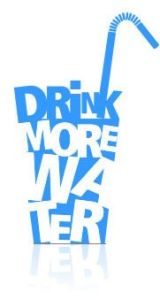 So what’s the moral here?
So what’s the moral here?
Water is a great assist during weight loss (we’ll raise a glass of H20 to that!) Drinking enough water and staying properly hydrated is part of a healthy body in general.
You may also like:
- Six Weeks to a Healthier Diet
- Smart Start Menu Series
- Tips for putting together healthy menus
- Walk Talk Series
Just click on the link to take you to the topics in the series
- Nutrition 101 – Introduction to basic Nutrition
- Nutrition 101 – Calories
- Nutrition 101 – Carbohydrates
- Nutrition 101 – Proteins
- Nutrition 101 – Fats
- Nutrition 101 – Micronutrients ( Vitamins and Minerals)
- Nutrition 101 – Fiber
- Nutrition 101 – Water
- Nutrition 101- Recap – 5 Tips to Eat More Nutritiously

